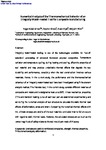Numerical analysis of the thermomechanical behaviour of an integrally water-heated tool for composite manufacturing
Date
2017-02Author
Subject
Metadata
Show full item recordAbstract
<jats:p> Integrally water-heated tooling is one of the technologies available for ‘out-of-autoclave’ processing of advanced thermoset polymer composites. Temperature variation and temperature cycling, during heating and cooling, affect the properties of tool material and may produce undesirable thermal effects that degrade the tool durability and performance, especially when the tool construction involves various materials. Hence, in the current study, the performance and the thermomechanical behaviour of an integrally water-heated tool have been investigated using finite element analysis method. The intended tool, in the current study, consists different materials of composite and metals and is designed to heat up to 90℃. Linear mechanical properties, coefficient of thermal expansions and transient heating curve of each tool part are determined experimentally and set during the numerical analysis of tool structure to calculate the static thermal load effects of deformation, stress and strain. Comparing the numerical thermal effects with the ultimate stresses and strains of the tool, materials concluded that no failure occurs with regard to static thermal loads. However, the calculated stresses are as much as the lowest magnitude of safety relates to the tool mould part made of Alepoxy. </jats:p>
Collections
Publisher
Journal
Volume
Issue
Pagination
Recommended, similar items
The following license files are associated with this item:


